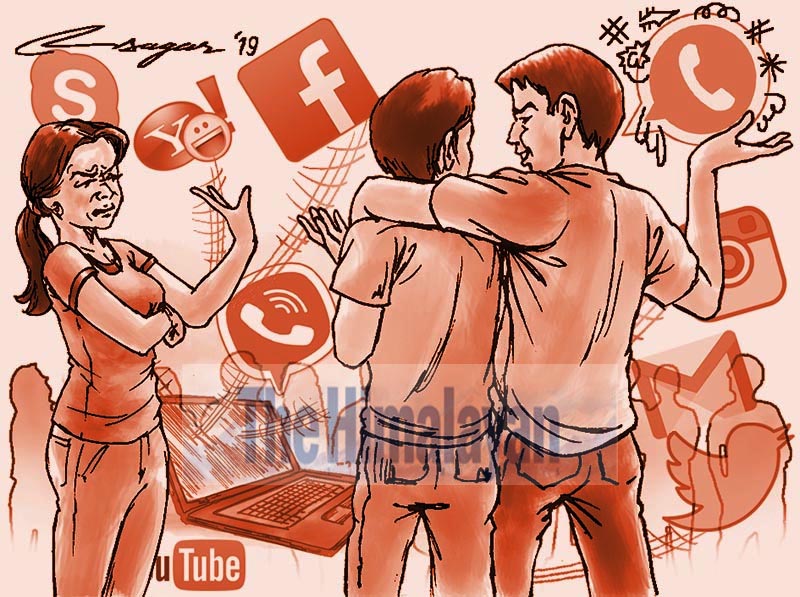Does ethics matter?: Damn care
Ethics is about being sensitive to others’ existence and values. If this does not happen, the ‘damn care’ attitude will destroy the humanity of our urban society very soon
I often contemplate on the language used by today’s youth — their seemingly blatant utterances that are no less scandalous by any means. In any public place I happen to be, I frequently encounter herds of youngsters talking insensitively in the most alarming manner. Could this be the end of an authentic social life among the youths? Or, is their social life evolving for the worse? Or, am I living a pro-human life too extremely?
Let us analyse an event that took place in eastern Nepal last week. Two guys, who were scrolling their mobile screens, passed some comments about Uri Basnet (name changed), who passed away due to unknown causes. The youths made rude remarks and even used abusive language about her son, who is only 14 years old. One of them remarked, “The kid could be the culprit behind his mother’s death.” I was shocked that these guys could think and talk so insensitively.
The other instance occurred while at a café with my office mates. Two girls who sat close to us abruptly started using abusive language about a passing boy. We all found it highly intolerable, and I could not help asking myself: how can anyone use such foul language in a public place so mindlessly and dispassionately?
These are just two examples, and obviously such incidents have become commonplace. What can we draw from such behaviours? The first incident is clearly an example of egocentrism, where people are only focussed on themselves and least bothered about the real people concerned with the events. And the second incident exemplifies the nothingness concept, which dictates that people’s existence is no longer valid. This is the cultural ambiance of the present day youth, who are demystifying their senses without humanity and social culture.
These ‘damn care’ utterances are representative voices that reflect the status, culture, society and the true self-worth being experienced by our youths. It is a direct result of the socio-environment they have been growing up in.
My concern is: what will be the knowledge construction of these youth? What will they transform as knowledge and values to the future generation? Haven’t such attitudes rendered moral values and ethics useless? These ‘damn care’ attitudes are a reflection that today’s young generation is living beyond the normal social circumstances. This has been brought on by the social media that promotes an artificial society, which has made the youth excessively self-centred.
In the Nepali context, our urban cultures are becoming dangerously self-centred. As social beings, our innate responsibility is to respect everyone’s existence. The younger generation better exhibit eagerness to uphold the principles of post-humanism, otherwise, their construction of new knowledge by transforming the cultural values will be destroyed by their ‘damn care’ attitude. The construction of knowledge is said to be a process, and the process is mostly influenced by human socio-cultural practices. The ‘damn care’ culture reflects downright selfishness and not the value of social practices of the real world. To the urban youth, who are more attracted by the artificial world, the socio-cultural values and practices are becoming less and less important.
German philosopher and sociologist Jurgen Habermas argued that the process of constructing knowledge in the social world is varied, depending on the socio-cultural practices. It might include some sort of certainty that may influence human subjectivity. The space of certainty, governed by human practices, could either be right or wrong, good or bad, acceptable or unacceptable. The defining principles of what is right or wrong are based on human actions, that are the process, and are termed as human ethics.
Ethics is about being sensitive to others’ existence and values. So, today’s urban young generation will have to be aware of the values of the social world and the artificial world equally to construct sensible knowledge and transform socio-cultural practices. If this is not done, the ‘damn care’ attitude will destroy the humanity of our urban society very soon.
Transforming our cultural practices and empathy, which are supposed to sustain post-human understanding and practices, is a serious matter.
Unfortunately, the urban youth’s perception and understanding of the post human is very low. The artificial social phenomenon is to blame, which is making the youth dependent on it and eating away their sensitivity towards the value of others.
Over dependence on the artificial world is leading towards mass insensitivity. Living in the artificial virtual world may grant immense satisfaction to the youth but that would not be real. One could interact in the social media, use emojis to express emotions, but all this cannot express the true feelings in the real sense. This scenario can lead the youths to a worsening crisis of ethical and moral values, or dehumanisation.
The aforementioned cases could raise these questions: Does the value of human ethics matter in the artificial world? How do you understand and internalise human values if you depend on the artificial world? These challenging questions need to be researched as they matter immensely. The ‘damn care’ attitude is something we can live without but not ethics!






